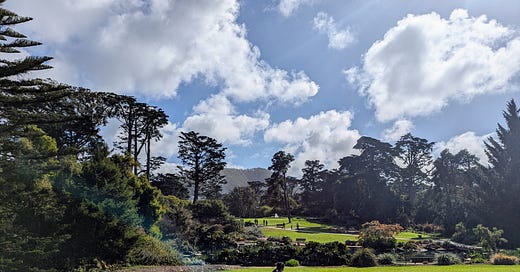When did I first start asking myself this question? I’m not sure. Maybe it snuck into my mind, uninvited. What is the meaning of life?
For years, I’ve asked myself this question, over and over, always coming up empty.
The other day, I posed this question to my five-year-old child.“What is the meaning of your life?”
She didn’t hesitate. Running freely across a grassy field, she turned back with a big smile.
“The meaning of my life is running in this grass field,” she said, before dashing off again.
In that moment, I stood still, struck by the simplicity and truth of her answer. A child doesn’t seek meaning. They don’t wonder about purpose. Their existence is unburdened, fully rooted in the present. They run, not to uncover some higher truth, but because it feels good. Because it is life.
It left me wondering—why do we ask this question at all? Why are we so obsessed with finding answers to something so vast and intangible? When did we lose the ability to simply be?
As children, we lived as my child does now—immersed in the moment, free from the weight of labels or grand narratives. We didn’t need a reason to laugh, to play, or to marvel at the world. We just were.
But somewhere along the way, we traded that simplicity for complexity. We began asking unanswerable questions: What is the purpose of life? What does it all mean?
And maybe that’s the problem. What if life truly has no meaning? What if searching for it keeps us from seeing the beauty of just living?
When Did We Lose This Simplicity?
Life doesn’t need to be defined. It unfolds as it is: we are born, we create relationships, we experience events, and eventually, we die. It’s a simple, cyclical process. Yet we humans seem determined to impose meaning on it, perhaps to shield ourselves from the discomfort of uncertainty.
But life doesn’t ask us for meaning. It asks us to live.
What if we’ve been asking the wrong question all along?
To Live Like a Child
Living like a child doesn’t mean regressing. It means awakening to a truth we once knew intuitively but have since forgotten. Children don’t need a constructed purpose to run in the grass—they simply run because it feels good. They don’t overthink or assign meaning to their play. They live fully, in the moment, and for the moment.
When we stop seeking meaning, we free ourselves from an endless quest. When we stop searching for purpose, we discover the beauty in existence itself. Life is not something to figure out. It is not a puzzle to solve or a concept to define.
Life, at its core, is a series of moments:
The sensation of wind on your face.
The sound of a bird singing.
The feeling of grass beneath your feet.
These are life’s moments. They don’t need to be explained or categorized—they just need to be felt.
The wisdom of life lies not in finding answers but in surrendering to what is. To live without seeking, to experience without questioning, and to simply be without defining—that is freedom.
A Final Reflection
A person is born. They form connections. They experience events. And then, they die. Life, unadorned, is neither meaningless nor meaningful—it simply is.
Anthony De Mello beautifully captures this truth:
“As soon as you look at the world through an ideology, you are finished. No reality fits an ideology. Life is beyond that. That is why people are always searching for a meaning to life. But life has no meaning; it cannot have meaning because meaning is a formula; meaning is something that makes sense to the mind. Every time you make sense out of reality, you bump into something that destroys the sense you made. Meaning is only found when you go beyond meaning. Life only makes sense when you perceive it as mystery, and it makes no sense to the conceptualizing mind.”
To live like a child is to run into the grass field, not because it holds meaning, but because it is life.
Perhaps the meaning of life isn’t something to be found, it isn’t something to be made of —it’s something to be lived.





42 (LoL, H2G2 reference)
Seriously though, Now is the only time that really exists. The past is gone, and the future hasn't arrived yet. The practice of mindfulness focuses on the here and now, on living in the present. Seeing the world through the eyes of a child isn't regressing, it's progressing from a complex viewpoint to one that is simpler, calmer, more peaceful, and much less stressful. Funny, I just posted about the benefits of this very thing: https://open.substack.com/pub/emotionalyou/p/five-benefits-to-being-more-present?r=bbig8&utm_campaign=post&utm_medium=web&showWelcomeOnShare=true